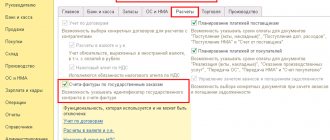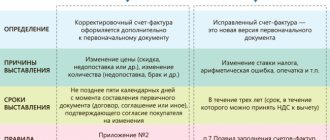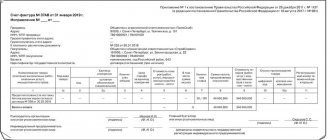Kontur.Accounting - 14 days free!
Friendly, simple and functional online service for small businesses.
Clear for the director, convenient for the accountant! Try it
There has been another transformation of one of the key documents for accounting - invoices. Very little time passed after the last July edition, and officials decided to make changes to the form again. From October 1, 2021, this form is required to be used, so let’s clarify: what has changed in the document, what new fields have been added and how to fill out the invoice now.
What has changed in the new invoice?
The main changes concern four points in the document; let’s look at them in more detail.
Firstly , in line “8”, where the identifier of the government contract/agreement should be indicated, the phrase “if available” has appeared. This is a technical change that does not affect the rules for filling out the document, but only clarifies that the identifier should be indicated if available.
The second innovation concerns suppliers who export goods to Belarus, Kazakhstan, Kyrgyzstan, and Armenia (EAEU). In the new form, column “1a” has appeared, in which you need to enter the code of the type of product, according to the Commodity Nomenclature of the EAEU. In previous versions of the invoice, this code was printed in one column with the name of the product. The same innovation also changed the form of the adjustment invoice. Now column “1b” has appeared there for making a similar entry.
The third change was the name of column 11. Previously, this column was called “Customs Declaration Number”, now officials have made a clarification, and the column is called “Customs Declaration Registration Number”. Let's remember: these are different numbers. In column 11, enter the number assigned to the document by the responsible representative of the customs authority. This requirement applies to goods manufactured outside the Russian Federation.
Fourth change. If the previous changes concerned organizations working under government contracts and conducting foreign trade activities, then the final point applies to all individual entrepreneurs.
Previously, the entrepreneur had to sign the invoice himself, but now an authorized person can do this for him. The signature line is now called “Individual entrepreneur or other authorized person.” Authorized persons include those who have a power of attorney to sign, certified by a notary.
The right to apply for VAT refund
The declarative procedure for VAT refund implies that the refund of the amount declared in the tax return is made before the completion of a desk tax audit based on this declaration.
This is a simplified procedure that allows companies to quickly and easily return funds. Starting from July of this year, there will be significantly more companies that have the right to this procedure. These will be added to those who have a guarantee from another company to secure the obligation to pay taxes.
However, the state also insures its own interests - a number of requirements have been established for the guarantor that guarantee its solvency:
- the guarantor must be a Russian company;
- he must not have debts on taxes, fees, penalties and fines;
- insolvency proceedings should not be initiated against him;
- it cannot be in the process of reorganization or liquidation;
- the amount of VAT, excise taxes, corporate income tax and mineral extraction tax paid by the guarantor for 3 years must be at least 7 billion rubles;
- the amount of obligations under existing guarantee agreements should not exceed 20% of the value of its net assets.
All these requirements are aimed at protecting the interests of the tax authorities, since it is the guarantor in the event of difficulties that will become the subject to whom financial claims will be sent.
Changes in the rules for issuing invoices
In addition to changes in the names of sections and lines of invoices, the requirements for filling them out have also changed.
Seller's address. In line “2a” you need to indicate the address of the seller that is indicated in the Unified State Register of Legal Entities or the Unified State Register of Individual Entrepreneurs. According to the old rules, the actual address was indicated in this column; now it is necessary to enter the address specified when registering a legal entity, and necessarily with a postal code.
Summary invoice. Innovations have been added for freight forwarders and developers. Their essence is as follows: if the forwarder involves third parties in the transportation, he can draw up a “consolidated” invoice, which includes the data of invoices received from the forwarding agents. From October 1, 2017, the forwarder fills out the “summary” document as follows:
- in line 1 the number of the “summary” document and the date are written according to its own chronology;
- in lines “2”, “2a” and “2b” the forwarder indicates his data;
- the name of the product is indicated separately for each seller in column “1”;
- Columns 2-10 contain data from invoices issued by sellers to the forwarder.
Developers register in separate positions in column 1 all construction and installation work, goods, services in accordance with the invoices issued to them by suppliers.
Online cash registers from 2021: procedure for transition and application
Law No. 54-FZ of May 22, 2003, which was in force until July 15, 2016, defined cash register equipment as cash registers that allow printing a cash receipt on paper. The new version of Law No. 54-FZ, effective from July 15, 2021, introduces the concept of “online cash registers” (Law No. 290-FZ of July 3, 2021).
The transition to online cash registers is not immediate, but gradual. Law No. 54-FZ, as amended, provides for four stages of such a transition.
Until February 1, 2021, all organizations and individual entrepreneurs were allowed to register and use old-style cash registers. As well as online cash register on a voluntary basis. From February 1, 2021, tax inspectorates register only online cash registers. It is no longer possible to register an old cash register from this date, but you can use previously registered old cash registers. But only until July 1, 2021.
- or purchase online cash register;
- or upgrade existing old cash registers to work online and register (re-register) them electronically through your personal account.
Who can avoid using online cash registers?
Online cash registers may not be used for the following types of activities (Clause 2, Article 2 of Law No. 54-FZ):
- sellers of newspapers, magazines and related products through kiosks, if the share of revenue from the sale of the press is at least half of the total turnover;
- sellers of ice cream and bottled soft drinks;
- those who are engaged in peddling trade, selling products at fairs, markets and exhibitions;
- those who sell milk, kvass, and live fish from tank trucks;
- those who sell seasonal vegetables, fruits and melons.
But by July 1, 2021, those who were previously exempt from using cash registers need to purchase an online cash register:
- UTII payers and entrepreneurs on PSN;
- firms and entrepreneurs who trade through vending machines;
- firms and entrepreneurs providing services to the public with the issuance of strict reporting forms (SSR).
Adjustment invoice
Changes in the form of an adjustment invoice repeat changes in the form of the main invoice. Firstly , column 1b has been added to the adjustment account form. It indicates the product type code. We fill out this column if the organization exports goods to the countries of the EAEU (Eurasian Economic Union).
Secondly , from October 1, 2021, it is allowed to add additional lines and columns to the adjustment invoice (for example, details of the primary invoice). In this case, the form of the adjustment document itself should not change.
Minimum wage in Russia from July 1, 2021
The minimum wage from July 1, 2021 will increase by 4% and amount to 7,800 rubles. Let us remind you that the minimum wage (minimum wage) is established annually by the Government of the Russian Federation on the basis of the Federal Law “On the Minimum Wage”. As a rule, changes in the minimum wage occur once a year.
| Validity | Minimum wage value |
| 01/01/2009 — 31/05/2011 | 4330 rub. |
| 01/06/2011 — 31/12/2012 | 4611 rub. |
| 01/01/2013 — 01/01/2014 | 5205 rub. |
| 01/01/2014 — 01/01/2015 | 5554 rub. |
| 01/01/2015 — 01/01/2016 | 5965 rub. |
| 01/01/2016 — 30/06/2016 | 6204 rub. |
| 01/07/2016 — 01/07/2017 | 7500 rub. |
| From 01/07/2017 | 7800 rub. |
Take into account the new minimum wage when making payments to staff for sick leave, pregnancy and childbirth (maternity leave), as well as for other purposes of compulsory social insurance. The minimum wage is also taken into account when paying insurance premiums for individual entrepreneurs and the self-employed.
Rules for storing invoices
The law requires that invoices be kept in the accounting department as they are issued or received in chronological order. The same rules apply to electronic document management of invoices: the dates of confirmation by the EDI operator of the issuance of invoices and notification of buyers are important here. The storage period for all types of invoices is 4 years. Copies of paper invoices from intermediaries must be certified by their signatures.
Keep records of invoices in the Kontur.Accounting web service. Easily generate invoices, send them to counterparties and receive them through electronic document management. Keep your accounting in our service, pay taxes and submit reports online.
Try for free
Electronic sick leave will appear on July 1
From July 1, 2021, it is possible to assign and pay benefits for temporary disability, pregnancy and childbirth on the basis of electronic sick leave certificates. Corresponding changes have been made to:
- Federal Law No. 255-FZ of December 29, 2006 “On compulsory social insurance in case of temporary disability and in connection with maternity” (hereinafter referred to as Law No. 255-FZ);
- Federal Law No. 323-FZ of November 21, 2011 “On the fundamentals of protecting the health of citizens in the Russian Federation” (hereinafter referred to as Law No. 323-FZ). Electronic sick leave can be issued from July 1, 2021 only with the written consent of a patient insured in the compulsory social insurance system. The form of electronic sick leave, as well as the procedure for registration and issuance of such an electronic document will be established by the Ministry of Health of Russia in agreement with the Ministry of Labor of Russia and the Social Insurance Fund of the Russian Federation.
An electronic certificate of incapacity for work will be generated in the information system of the Federal Social Insurance Fund of the Russian Federation and stored in it with an enhanced qualified electronic signature of a medical worker and a medical organization.
It is assumed that it will be possible to exchange information about sick leave between enterprises, clinics and the Social Insurance Fund through a special software resource that will appear in the near future.
The introduction of electronic sick leave does not oblige enterprises to switch to an electronic format. Traditional certificates of incapacity for work on paper are not canceled and will continue to be valid.
Liability for violations in the field of personal data from July 1, 2021
On July 1, 2021, Federal Law No. 13-FZ of 02/07/2017 “On Amendments to the Code of the Russian Federation on Administrative Offenses” comes into force. The composition of administrative offenses in the field of personal data and responsibility for them are changing.
Instead of one general structure - violation of the procedure for collecting, storing, using or distributing personal data - there will now be seven grounds for holding citizens, as well as officials and legal entities, accountable. The penalties are significantly more severe than the current provisions.
Fines for officials and legal entities related to the processing of personal data are increasing. These changes are presented in the table.
| The essence of the changes | How did it happen | As it was | ||
| Norm of the Code of Administrative Offenses of the Russian Federation | Contents of the norm | Norm of the Code of Administrative Offenses of the Russian Federation | Contents of the norm | |
| The composition of administrative offenses in the field of personal data has been changed | Clause 1 of Article 13.11 | — processing of personal data in cases not provided for by the legislation of the Russian Federation; - processing of personal data incompatible with the purposes of collecting personal data, if these actions do not contain a criminal offense, entails... the imposition of an administrative fine...: - on officials - from 5,000 to 10,000 rubles; — for legal entities — from 30,000 to 50,000 rubles | Article 13.11 | Violation of the procedure for collecting, storing, using or distributing personal data entails... the imposition of an administrative fine...: - for officials - from 500 to 1000 rubles; — for legal entities — from 5,000 to 10,000 rubles |
| Clause 2 of Article 13.11 | - processing of personal data without written consent of the subject of personal data to the processing of his personal data..., if these actions do not contain a criminal offense; - processing of personal data in violation of the established requirements for the composition of information included in the written consent of the subject of personal data to the processing of his personal data entails the imposition of an administrative fine: - for officials - from 10,000 to 20,000 rubles; — for legal entities — from 15,000 to 75,000 rubles | |||
The accounting department’s task is to obtain a signed Agreement on the Use of Personal Data from all its employees by July 1, 2021.
For example, this.
An example of an employee’s written consent to the processing of his personal data
We often fill out similar Agreements in various structures, both government and commercial. For example, if you contact a government services center, you most likely sign such agreements.
Starting from October 1 of this year, a new invoice form will be introduced. The form has undergone some significant changes and may cause some difficulties when filling out even for experienced accountants. Let's look at the new version of the invoice and tell you in detail what changes were accepted, what fields were added to the form and how to fill out the new invoice. Additionally, a sample document will be provided that will serve as an example for filling out the form.
An invoice is a document that is used by the buyer as a basis to confirm the acceptance of the VAT amount for deduction or reimbursement. Taking into account certain provisions of the Tax Code, the document must be drawn up every time the company’s products or services or other property rights are sold. Invoices can be issued in two ways:
- electronic;
- on paper.
The paper version is presented in Appendix No. 1 to RF PP No. 1137 dated December 26, 2011. The legislative act approves all the forms necessary for conducting the economic activities of an enterprise, which will be used in the future when calculating VAT. The list of such documents includes:
- invoice and correction form;
- log of received and issued invoices;
- purchase books;
- sales books.
In the case of electronic document management, the seller and buyer must use compatible software and issue invoices in a single key. Of course, the completed documents must comply with all the requirements specified in individual legislative acts.
Regulations on the register of trusted operators
In a letter dated October 8, 2021 No. EA-3-26/ [email protected], the Federal Tax Service reminded who is required to submit tax reports (calculations) for the TCS through the EDI.
Tax reporting (calculations) for TKS through the EED (with some exceptions), in accordance with paragraph 3 of Article 80 of the Tax Code of the Russian Federation, are required to be submitted by:
- taxpayers and insurance premium payers with an average number of employees for the previous calendar year of more than 100 people;
- newly created organizations with more than 100 employees;
- taxpayers for whom the obligation to submit reports in electronic form is provided for by Part 2 of the Tax Code of the Russian Federation (in particular, when submitting a VAT return);
- largest taxpayers.
As you can see, all VAT payers are required to submit tax reporting, including explanations to the declaration, in electronic form.
The intermediary in the transfer of electronic documents is the operator of the EDF system. But not just anyone, but a “trusted” one.
By Order of the Federal Tax Service dated October 23, 2021 No. ED-7-26/ [email protected], the Regulations on the Register of Trusted Operators of Legally Significant Electronic Document Flow were approved. It is these trusted operators that ensure electronic document flow via TCS using qualified electronic signature verification key certificates for issuing and receiving invoices. Their register is posted on the Federal Tax Service website.
Order No. ED-7-26/ [email protected] is valid from October 23, 2021. Order of the Federal Tax Service dated April 20, 2012 No. ММВ-7-6/ [email protected] , which approved the Temporary Regulations on the Network of Trusted Operators of Electronic Document Management , has become invalid.
Advance invoice: what you don’t need to fill out
The following may not be filled out in the advance invoice:
- lines (3) and (4) – name and address of the shipper and consignee;
- columns 2, 2a, 3 and 4 – unit of measurement, price and quantity of goods, works or services;
- column 5 – cost of goods (work, services) excluding VAT;
- column 6 – excise tax amount;
- columns 10, 10a and 11 – information about the country of origin of goods and the customs declaration.
Here's what an invoice form looks like in 2021:
You can submit an invoice valid until June 30, 2017.









